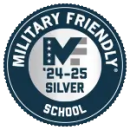GMDV 110: Introduction to Game Development
Explore Game Development
The online bachelor's degree in Game Development is a comprehensive program designed to empower students with the expertise and abilities needed to excel in the dynamic and competitive realm of computer game development. This program prepares students to meet the demands of today's digital entertainment and interactive markets, offering a strong foundation in game development principles and methodologies.
Students will develop a deeper understanding of the game development industry, including the ideation and conception of game ideas, software programming and technical design, efficient project management, the intricate world of Artificial Intelligence, and Human-Computer Interaction.
Finish your program faster with credit for prior learning and experience.
Differentiate your degree and get your resume noticed with an added certificate. Speak with your advisor for information.
Build Your Career Future
Having a degree can increase both your immediate job prospects and your long-term career potential. Graduates of this online Game Development program are equipped with the skills and knowledge necessary to conceptualize and develop games in a wide variety of industries such as marketing and advertising, business, and education, in addition to traditional computer gaming.
Program Curriculum
Champlain's online game development courses are designed to equip students with the technical expertise and creative problem-solving skills essential in today’s gaming industry. Graduates of the program are required to complete the following courses.
Game Development Courses (27 credits)
Design and Programming Foundations Courses (21 credits)
Project Management Courses (6 credits)
Technical Electives (9 credits)
General Electives (15 credits)
General Education Courses (42 credits)
Computer game development is a broad industry involving the coordination of multiple digital technologies and creative design elements. In this course, students explore various computer game genres, the history, philosophy, and ethics of computer games, and methodologies for documenting and directing the game development process. Additionally, students examine the nature of play and engagement in the digital realm, as well as the application of diverse viewpoints in considering the intended game audience and the narrative construction of the games themselves.
Human-Computer Interaction (HCI) is an essential study of how people use computers and digital devices. In this course, students study the concepts of user experience, interface design and usability, and device response and feedback. Students understand the fundamental principles of developing interactive computer systems for desktop, console, and handheld applications. Students will be guided in the application of HCI design principles to computer game development, considering technologies such as virtual and augmented reality, handheld devices, and haptic feedback.
Creating computer games requires the ability to think logically and conditionally. In this course, students develop skills to write and understand pseudocode as a tool for outlining programs. Students write sample game outlines that consider player decisions, action choices, and the resulting narrative branches that unfold within the game. By the end of this course, students will be able to make use of branching scenarios, conditional decision making, and other programming concepts applied specifically to game development.
Computer games have evolved dramatically since the text adventure games of the 1970s. In this course, students will survey changes in game technology and the development process from the independent game designer model to the current collaborative approach linking diverse remote teams through modern collaborative software systems. Students create compelling narratives while considering the psychology of play. By the end of the course, students will have experience with level development and the utilization of objects, locations, and NPCs.
Prerequisites
Computer games require the application and manipulation of audio, graphic, and animated elements. In this course, students use their programming knowledge and skills to reproduce physics behaviors within game environments. Students consider the requirement limitations necessitated by mobile screen size constraints and how interface variations can improve the player's experience. By the end of the course, students will develop more complex games through collaborative teamwork and the integration of various media elements.
Prerequisites
SDEV 240: C++ Programming I and GMDV 230: Essentials of Game Programming
Artificial Intelligence is one of the most important factors that influences engagement in a computer game. In this course, students learn modern techniques for implementing AI behaviors in computer games as opponent play, non-player characters, and environmental control agents. Students explore how realistic behaviors are developed algorithmically, implementing procedural content generation. Many mobile apps utilize AI for engagement in single-player games, and by the end of this course, students will be proficient in crafting code to drive challenging opponent behavior.
Prerequisites
GMDV 330: Game Development Techniques
Advanced game development involves the creation of game worlds and the integration of multimedia elements in Unity, resulting in a small-scale playtest-ready program. In this course, students collaborate in expanding game code frameworks, level designs, AI behaviors, and interface designs prototyped in previous courses. Advanced techniques in optimization, diagnosis of gameplay bugs, performance benchmarking, and best practices in team management will be covered. By the end of this course, the student will have a codebase ready for the Capstone project.
Prerequisites
GMDV 330: Game Development Techniques
Mobile devices represent a rapidly expanding platform and market for computer games. In this course, students develop game mechanics, sound and visual effects, scalable graphics, and narrative frameworks for mobile devices. Students will leverage asset libraries to populate their games and develop multimedia appealing game experiences based on development and prototyping work completed during courses taken previously in the program. By the end of this course, students will have a completed mobile game framework to use in their Capstone course.
Prerequisites
SDEV 340: C++ Programming II and GMDV 330: Game Development Techniques
The final experience in the Game Development program is to assemble a functional desktop or mobile mini game. In this course, students refine and assemble components of code and frameworks developed in the previous program courses. Students will also make use of provided audio, graphic, and animated assets for greater multimedia appeal and polish. Students may choose to work in small teams on more comprehensive projects. The outcome of this course will be a playable computer game.
Prerequisites
All program courses.
From day one, students in this course are problem solving, first in terms of algorithmic design and then as early as week two via programming in the latest version of Python, using PyCharm. Students begin by writing a program to have a conversation, having strings and numbers as input, and advance, by week seven, to building a working password saver program, capable of looking up, adding (and encrypting), and storing passwords.
Learn the basics and more in this course on Relational Database Management Systems (RDBMS) and SQL (Structured Query Language). Students propose a final project in the first module and then work, week-by-week, to design, create, and populate the database. Then, students learn to create queries and stored procedures.
Python is a programming language with broad appeal because of its accessibility, community, sponsorship and utility. In this course students learn additional Python programming concepts and further develop their skills. Students progress from lists and basic structures to Object Oriented Programming, including objects, classes, encapsulation, abstraction modularity, memory management, inheritance and polymorphism. Students also learn advanced Python language features such as iterators and generators, along with error and exception handling.
Prerequisites
Complete CMIT-135
This course introduces students to the fundamental language of visual form and basic skills including the industry-standard software applications used to create, acquire, and manipulate digital images. Students will learn about two-dimensional composition and design, color theory and terminology, and will apply these principles to a variety of basic design projects. Color, form and content will be explored in terms of cultural, psychological, physiological, and historical aspects.
This course covers the fundamentals of systems analysis while emphasizing the role of communication and other soft skills needed in IT and in business overall to be successful. The topics are useful for anyone who is involved in developing software system requirements and architectures (e.g., users, technical managers, product managers, technical leads, programmers, other software project team members, and clients).
Prerequisites
CMIT-135, CMIT-200, MGMT-260
This course will introduce students to programming concepts, using a major industry programming language, C++. SDEV-240 covers the history of programming languages, the essentials of the C++ programming language, and how to write effective and efficient programs to solve a variety of real-world problems.
Prerequisites
CMIT-135
The focus of this course is to cover the robust and powerful features of C++ and Object Oriented Programming. These skills will serve as a foundation to transit to develop Client/Server, Database driven applications and simulations.
Prerequisites
SDEV-240
Project Management is the formal application of knowledge, skills, tools, and techniques to project-based activities to meet organizational requirements. Project management is accomplished through the use of processes such as Initiating, Planning, Executing, Monitoring and Controlling, and Closing. Project managers can divide projects into these phases to provide better management control with appropriate links to the ongoing operations of the organization. Collectively, these phases, known as the project life cycle, form the foundation for the practice of project management and are guided by the Body of Knowledge from the Project Management Institute (PMI).
The traditional practice of project management is based on the notion that the customer can understand and articulate his or her requirements fully and up front. Unfortunately, this is rarely the case and often customers either don't understand precisely what they need or, more often, will know it when they see it. This is where Agile Project Management comes in. Whether you are managing a project, are on the forefront of a new business venture, or are developing new business processes, Agile Project Management can help managers meet their goals without compromising business value or quality. This course will provide a foundation in Agile and build competencies in Agile Project Management through simulation, case study analysis, and software. Students will receive hands-on experience with agile and scrum processes in a class project. Students will also investigate Agile value principles, release planning, portfolio governance, and the Scrum methodology.
In addition to the following requirements, students must also complete 3 Credits of a General Education Elective (Any ARTS, COMM, CRIT, ECON, ENGL, HIST, MATH, PHIL, PSYC, SCIE, SOCI, MKCM 120, CRIM except CRIM-225)
This course introduces students to the foundational concepts needed to communicate effectively in writing for academic study and professional development. Students will also learn to read critically to evaluate an author's message. Students will be introduced to rhetorical modes and their role in the development of written communication. Students will also learn how to use revision strategies to create written communication that meets its intended purpose for its intended audience
This course builds on students' proficiency in the writing process and rhetorical modes to introduce the use of sources in written communication. Students will practice information literacy as they learn to determine information needs from sources, develop effective search strategies, and incorporate sources in written communication, legally and ethically.
Prerequisites
Complete ENGL-100
Starting with a frame of human communication as a dynamic system of interactions in which people make choices that impact their relationships, other people, and themselves, students will define theory-informed communication concepts and processes, and critically examine how they apply to everyday life across a variety of contexts. Students will reflect on how the theory, concepts and processes apply to their own lives in becoming competent communicators who are knowledgeable, skilled, and versatile.
This course examines the principles of effective small group interaction. Students will analyze group development stages and small group roles. They will identify and evaluate communication skills that enhance small group cohesion and problem-solving. Students will explain how conflict affects group processes and compare face-to-face versus digital collaboration environments. These skills prepare students to participate effectively in group settings across academic, professional, and community contexts.
Students will learn and apply critical inquiry skills to analyze persuasive communication created by others and to develop persuasive communication/arguments of their own to solve problems in professional, civic, social, and personal contexts. Specifically, students will learn to recognize fallacies in logic; apply inductive and deductive reasoning strategies to the interpretation and development of persuasive communication; evaluate the validity of sources; and develop logically sound persuasive communication. Students will explore the roles of self-awareness, empathy, and ethics in the context of critical inquiry and the development of arguments.
Prerequisites
Complete ENGL-110.
This course is an historical overview, and examination of the evolution of digital, film, and print media, and their functions. Students will identify and analyze contemporary problems of the media such as the legal, social, economic and psychological implications of their relationships with society. They also will examine the ways in which marketing and PR professionals utilize the mass media channels to reach their intended target audiences.
This course explores the complex and evolving relationship between human beings and technology. Through a multi-disciplinary approach that draws on fields such as sociology, psychology, philosophy, and history, students will examine the ways in which technology has shaped human culture, identity, and values, as well as how humans have influenced and continue to influence the development, adoption and use of technology.
Mathematical reasoning, when applied to everyday and professional lives, has two dimensions: logic for deterministic situations and probabilities for non-deterministic situations. This course aims to help students develop these mathematical reasoning skills.
This course introduces students to basic statistics for data literacy. With a focus on exploring real-world data, students will interpret numerical information and utilize the tools necessary to complete the entire statistical process: designing a study; gathering, organizing, and analyzing sample data; and making inferences about a population. Students will demonstrate data-driven decision-making and effective communication of numerical data.
In this course, students will gain an introduction to classical mechanics and learn about motion, force, energy, and momentum. The course covers vectors, scalars, and coordinate systems, as well as kinematics in one and two dimensions, Newton's Laws of Motion, circular motion, and kinetic energy and work. Students also learn about potential energy and energy conservation, collision theory, rotational motion, moment of inertia, torque, rotational dynamics, and angular momentum.
This course will introduce students to major streams of social justice thought, including historical social justice movements, theoretical problems having to do with social equality, personal freedom, marginalization, and stigmatization, and the ways in which civic and professional communities respond to these issues.
With pressure and release, a window opens and closes, recording light on a sensor. The simple action captures the instinct, judgement, and skill of the person behind the lens. This class will begin a study of the art and craft of photography. Students will develop their vision and their understanding of how to achieve it. Solid skills will be learned and many doors will be opened.
A survey of the continuing change experienced in art since the 15th century. Students will examine how an image is achieved as well as the significance of the subject represented. Individual inquiry concerning the nature of art is encouraged.
Students learn to appreciate films through the critical analysis of various elements of mise-en-scene, cinematography, editing and sound. The course introduces the conventions of classical Hollywood cinema, considers the work of one major director (auteur), and surveys selected international and independent films. Students view and discuss films each week.
Students in the course will explore the cultural history of the music genre broadly referred to as rock. Students will explore the social, economic and political contexts that are influenced by and that influenced each style in the United States. By listening, watching, reflecting upon, discussing and writing, students will explore how music takes on meaning, personally, and culturally. Topics and themes include the relationships between and among gospel, country, funk, folk, disco, rap and hip hop; the role of business and technology in those relationships, and political or transgressive elements of rock music.
Specific application of common tools for writing in the working world. Students will be instructed in rhetorical strategies of professional writing including style, report formats, editing, document design, and integration of visual aids. Students will complete a semester-long writing project; oral and written reports associated with the process of problem-solving within the project will be included.
Prerequisites
ENGL-112 or COR-125
Students will learn how to create conditions for successful conflict engagement, a necessary skill for any professional. The course focuses on the foundational capacities to remain calm and connected with oneself and others. In this state students can access helpful ideas and responses and be their best selves regardless of environment. Improving facility for conflict creates stronger relationships and reduces fear. By the end of the course, students will understand that disagreement and difference can become a source of personal and interpersonal growth.
In this course, students will explore and apply writing principles and techniques to effectively interpret and write technical workplace materials. Students will enhance and gain skills to communicate business and technical information by producing instructions, describing processes, applying document design elements, creating and integrating illustrations, researching and writing proposals and formal reports, and presenting content for decision-makers.
This course introduces students to the fundamentals of substantive criminal law. With this foundation for understanding the legal system students will identify the essential elements of crimes, including the criminal act, criminal state of mind, and jurisdiction. They will examine the rationale underlying criminal law, factors affecting criminal responsibility, and legal defenses. By analyzing real-world scenarios, students will develop skills to distinguish lawful from unlawful actions and prepare for advanced studies or careers in criminal justice.
This course focuses on the rules and procedures governing how the American criminal justice system must process individuals suspected, accused, and convicted of law violations.
In this course, students will explore the theory and fundamentals of criminal investigation, emphasizing practical applications for evidence handling and case development. Students will review basic responsibilities of investigators and protocols for report writing, evidence collection, and preparation of cases for trial. The curriculum examines investigative approaches for various crime categories, including violent offenses, property crimes, terrorism, and hate crimes, while introducing comparative perspectives from diverse legal systems.
Prerequisites
Take CRIM-120.
Principles of Economics introduces the fundamental concepts of economics - the study of how people manage resources, and how they react to scarcity. This course focuses on both microeconomics (the behavior of consumers and companies) and macroeconomics (large-scale economic factors such as employment and interest rates), so that you'll gain a broad understanding of how a modern market economy functions, how decisions in business settings are informed by economics, and how economics applies to your everyday life.
Students will study important themes in the social history of the United States since the Civil War. This course allows students to expand their critical thinking skills through an examination of primary and secondary sources. Themes might include: the evolving status of women; the immigrant experience; the concept of the American dream; the paradox of freedom vs. slavery; the minority experience; the tensions between social classes. Students will be evaluated primarily on writing assignments.
In this course, students will explore broad, foundational knowledge in psychology, including its history, major theorists and a survey of psychology subfields such as developmental, cognitive and social psychology. Students will also describe and assess the role of ethics and social responsibility in the study and application of psychological theory and practices.
In this class, students will explore how social relationships, groups, societies and culture develop and change over time. From a sociological theory foundation and employing the sociological imagination, students will examine the impact of social structures, institutions, and systems on individual lives. Students will apply sociological research methods to investigate sociological phenomena in their own lives.
Starting Fall 2026 the following changes will be made to the General Education curriculum:
- New category, Integration: CRIT 100 Mindsets for Modern Learning (3 credits)
- Social Science and Arts & Humanities categories combine, still just 6 credits required.
- General Education Electives: credits increase to 6
Additional Program Details
Graduates of the game development bachelor's online program will demonstrate the following industry-specific skills, knowledge, and competencies:
- Analyze and categorize computer game types, technologies, genres, and targeted audiences based on their distinct characteristics.
- Apply software design principles to optimize computer games for playability, usability, and accessibility across various platforms.
- Collaborate effectively in remote environments and promote diversity, equity, and inclusion in game development.
- Design and implement engaging game mechanics for diverse physical abilities, including puzzles, branching scenarios, and Non-Player Characters.
- Utilize programming techniques and pseudocode for efficient game development and implementation, considering usability and accessibility.
- Integrate multimedia assets into game frameworks, with attention to aesthetics, functionality, and accessibility.
- Evaluate the societal impact of games, addressing bias and incorporating principles of diversity, equity, inclusion, accessibility, and usability in game design.
Design your own degree and enhance its value and focus by adding a certificate. Adding a certificate allows you to develop specialized skills, strengthen your résumé, and tailor your education to align with career goals. Choose from the undergraduate or graduate certificates on this page.
Note: To earn a certificate, you must speak with your advisor first. You must be officially enrolled in the certificate program before you complete the required courses in it — coursework completed prior to enrollment cannot be applied later, and certificates may not be added retroactively. Careful planning with an advisor is essential to ensure all policies and timelines are met.
- Unity
- Adobe Photoshop
- Adobe Illustrator
- Adobe Audition
- Inklewriter
- Python
- C++
Our admissions team seeks to admit students who:
- Demonstrate a solid academic foundation - a minimum 2.5 GPA is our recommendation, though exceptions may be made on a case-by-case basis for those who demonstrate a potential for academic success in other ways.
- Possess an aptitude for success in an online learning environment.
- Exhibit the ability to make a positive contribution to the Champlain College Online community.
To learn more about submitting transcripts, or requirements for home-schooled students, those educated abroad or returning students visit our Undergraduate Admissions page.
Our transfer credit evaluation team works hard to ensure you get the transfer credits you deserve, from a variety of sources including prior college credits, work experience and training, military training and experience, and more. Our goal is to help you graduate from Champlain College Online as quickly and affordably as possible. Visit our Transfer Credit Options page to learn more.
Champlain College Online's game development faculty, led by Program Director Michael Fay, are expert practitioners in the field. Their industry expertise ensures that our curriculum is aligned with the needs of employers, and reflects the skills today’s game professionals need for success. Classes led by our seasoned experts will give you real-world insight into the world of gaming, and create a rich community of career-focused learning.
Tuition & Costs
Online Undergraduate Tuition Fall '25 - Summer '26
Tuition & Costs
Online Undergraduate Tuition Fall '26 - Summer '27
* Alumni is defined, for this tuition rate, as any degree program graduate from Champlain College or Champlain College Online.
** Veteran rate effective Spring 2025, not retroactive
See the undergraduate cost of attendance and fees here
Affordability and Paying For Your Education
We provide a number of options to make your online education affordable, including preferred tuition for alumni, associate degree graduates, community college graduates, and military.
What Can I Do With A Degree In Game Development
Game developers occupy pivotal roles within multifaceted creative and technical teams. Salaries in the tech industry in the United States are rising, with robust demand for highly skilled tech professionals driving these increases. According to the Society for Human Resource Management (SHRM), this demand remains strong, emphasizing the favorable job market for tech specialists.
Looking ahead, experts anticipate a continued surge in growth for the video game industry. In 2020, global market analysts valued the video game market at a substantial $167.5 billion. Projections indicate that by 2027, this value is poised to increase significantly, nearing $291.2 billion.
https://www.computerscience.org/careers/video-game-designer/career-outlook-and-salary/
Possible Career Paths Include
- Game Developer
- Game Programmer
- Computer Programmer
- Software Developer
- Mobile Game Developer

Academic Excellence and Recognition

Regionally accredited by the New England Commission of Higher Education

Designated as a Military Friendly School for our commitment to the military community
Ranked among the best by Tech Guide for game design and computer science

Named the among the best schools with accelerated bachelor's degrees by Intelligent.com
Meet the Program Director
John Selig
- Interactive Game Design
- Game Development
About
John Selig is a multi-disciplinary creative and engineer, whose career walks the line between the artistic and the technical. He studied Animation and Computer Science at Harvard, working on a variety of creative projects since. As someone with multiple interests, Games and Interactive Media are a natural fit, bringing together so many separate disciplines: art, programming, storytelling, experience design, and more.
It's no surprise John ended up working in games: he beat Mega Man 2 before he could ride a bike, and his friends used to tease him for running like Sonic on the playground. His childhood notebooks are filled with game ideas, drawings, and maps. At age 9, he even pitched an unsolicited idea to Nintendo (receiving a kind and encouraging rejection letter).
After a long career in technology leadership, John is excited to return to education as Program Director for CCO Gaming. Teaching has always been a major passion, and he specializes in introducing technical concepts to beginners, and getting students excited about the creative potential of technology.
Additionally, John has traveled the world studying mythology and ancient religion, and these themes often find a way into his various creative projects, including games. In addition to programming and design, he’s a lifelong rock musician, and has taught at Harvard, Boston University, UCLA, and more.

Frequently Asked Questions
A game designer focuses on concepts, storylines, characters, and gameplay mechanics, while a game developer programs and builds the game using coding and software development skills. Learn more about these roles here.
To become a video game developer, earn a degree in computer science, game development, or software engineering, learn programming languages like C++ and Python, build a portfolio, and gain experience through internships or personal projects. Learn more about what it takes to break into this cutting-edge field here.
Game developers need skills in programming (C++, C#, Python), game engines (Unity, Unreal), problem-solving, math, AI, and teamwork to create and optimize games. Champlain College gives you the industry-essential concepts and practical expertise you need to excel in game development through a flexible, online BS in Game Development.
Yes. This program includes coursework designed to teach you how the rapidly evolving world of AI technology is impacting game development. There is a specific course, Game Behavior and AI Opponents, that teaches modern techniques for implementing AI behaviors in games. Upon completion, you can have the skills to craft code that creates challenging AI opponents.
Yes! If your goal is to work in the gaming industry, you need a solid foundation of skills that translates into success in today’s AI-driven world. With structured training and guided education in programming, design, and industry-standard tools, you can build career-ready skills. Plus, throughout your learning, you can develop a strong, attention-grabbing portfolio to show prospective employers.
You May Also Be Interested In
Learn More About The BS in Game Development Program
Learn what you can expect from our online bachelor's in game development program.

Download Program Guide
I acknowledge that, by clicking the "submit" button, I am giving my express written consent to Champlain College and its representatives to contact me about educational opportunities via email, text, or phone, at the phone number above, including my mobile phone, using an automatic dialer, or pre-recorded message. Message and data rates may apply. I understand that my consent is not a requirement for enrollment, and I may withdraw my consent at any time.






